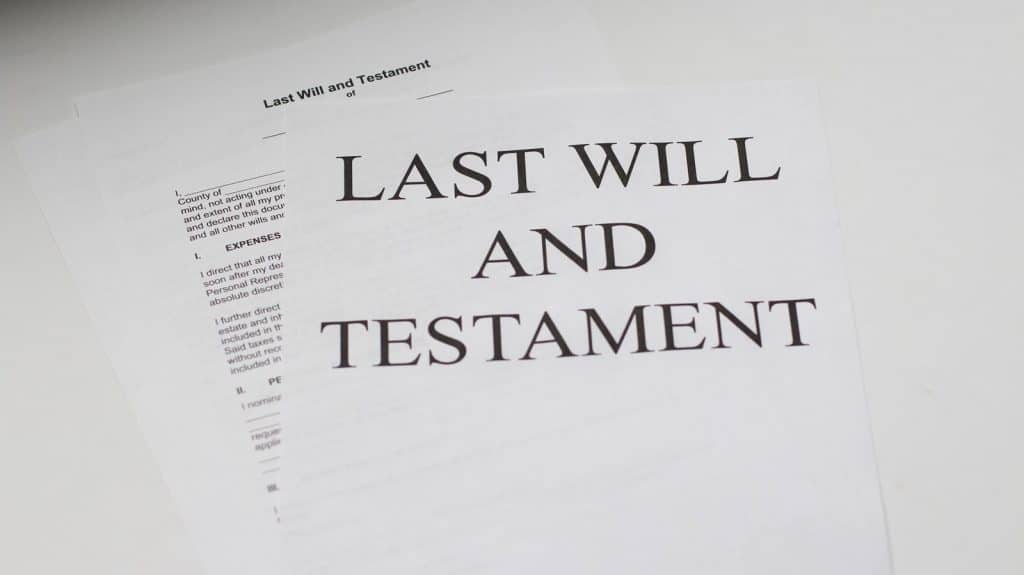Wills & Trusts
Learn more about estate planning from Chicago trust attorneys Robert J. Ross, Patrick F. Ross, and Daniel R. Ross.
Effective for Calendar Year 2025
Last updated 1/22/2025
PDF Version
Estate planning is more than simply signing a will. It is your comprehensive plan for the enjoyment, use and disposition of your assets during your lifetime, while you are disabled and after your death. It may also include asset protection and tax considerations through the use of living trusts, beneficiary designations and asset re-titling. A good estate plan has three primary objectives:
- To establish a plan for your care and for the benefit of loved ones during your disability
- To minimize exposure of assets to taxes, creditors, probate, fees, expenses, and publicity
- To control the efficient use and eventual distribution of assets in the manner you direct after your death by a person who you choose to act as fiduciary

It takes a lifetime of hard work to accumulate assets. People plan to use their assets to provide for needs during life and then benefit their family, friends and charities. Effort now will make it more likely that your estate plan will accomplish your desires.
Typical Estate Planning Documents

A typical estate plan includes the following documents:
- Will
- Declaration of Trust (also known as a revocable living trust)
- Power of Attorney for Property
- Power of Attorney for Health Care
- Living Will
- HIPPA Authorization
Your Will
Every competent adult should consider signing a will, regardless of wealth, age, marital status or health. A will is a formal written document which becomes operative at your death in order to:
- Appoint a guardian for minor children
- Direct how your assets are to be distributed (e.g., to pour assets over into your living trust)
- Designate an executor who is responsible for taking inventory of your property, paying debts and taxes and distributing assets as you direct
If You Die Without a Will ("Intestate")
Illinois law contains “default” rules on how your assets will pass to family members if you die without a will. These default rules may conflict with how you desire your assets to pass at your death. Without a will, the Probate Court will choose guardians for your minor children and appoint an administrator to handle your financial matters (after purchase of a surety bond). Although disclaimers may be carefully and quickly implemented in some instances to minimize estate taxes, your estate will not automatically benefit from estate tax planning which is available by having a will and living trust.
Probate
Assets that pass under Probate Court administration include assets which you own in your own name alone at death without a surviving joint tenant or “pay on death” beneficiary. Small estate affidavits can sometimes be used to transfer assets in Illinois when the assets in a decedent’s name total under $100,000 and all creditors have been paid.

Non-Probate Assets
Examples of assets which often do not require Probate include:
- Assets titled in a revocable living trust (i.e., owned by you in your name as trustee of your living trust)
- Assets which are established with provisions to “pay on death” to named surviving beneficiaries (e.g. real estate, securities, bank accounts, life insurance, retirement accounts)
- Assets held in joint tenancy with right of survivorship which pass to one or more surviving joint tenants
Living Trust
You retain the ability to spend, save and manage your assets in your living trust as you see fit while you are alive and competent. You are not required to file additional income tax returns or reports or pay another trustee while you act as trustee. Most persons act as trustee of their own living trust and name a spouse, child, relative and/or trusted friend to act (one at a time) as successor trustee. A bank or trust company is typically named as final successor trustee in the event the named individuals do not act. Your chosen successor trustee will manage assets for you during a time when you are disabled and upon your death without the time, expense and exposure of probate. Importantly, you can change or revoke your living trust any time while you are competent.
In your living trust, you declare that property which you re-title into your name as trustee of your living trust is held subject to the terms of the trust. If you become mentally disabled, your successor trustee is empowered to use assets in your living trust to support you and your loved ones who you have selected in advance. Upon your death, the successor trustee follows your direction to distribute or hold the assets for one or more of your beneficiaries. Assets which you leave in trust for your children can be protected from being counted for needs-based benefit programs, various creditors and divorcing spouses.
Assets in your living trust (and other assets over which you have control) are included in your gross estate for estate tax purposes. These assets are also typically counted when determining Medicaid eligibility. Living trusts do not shield your assets from your own creditors.
Distribution of Assets at Death
Provisions which create one or more additional trusts at your passing are often included in your living trust. In this way, you direct how, when and to whom trust property will be distributed. You can include trusts for your spouse, trusts for children, special needs trusts for disabled beneficiaries, spendthrift trusts and other provisions. Your trustee will hold property in a manner designed to minimize estate taxes and limit interference by subsequent spouses, creditors and others. The successor trustee can be directed to hold money for minors until they reach certain ages, staggering principal distributions over a period of several years while still providing for the beneficiary’s needs. Assets can also be held for future generations. Living trusts are administered privately and do not subject your personal and financial matters to costly public probate proceedings.
Irrevocable Insurance Trusts ("ILITs")
For larger estates, persons sometimes create ILITs (in addition to living trusts) to minimize estate and gift taxes. As with other lifetime gifts, you surrender power and forego benefit from the ILIT’s income and principal. Unlike living trusts, ILITs cannot be amended and do require steps to be taken each year. ILITs are used in advanced estate planning and are not discussed in detail in this basic Memo.
Federal Estate and Gift Taxes

United States citizen spouses can give unlimited amounts to each other and to qualified charities without incurring gift tax or estate tax. Current law imposes a gift tax when assets are given to someone other than your spouse or a charity. Assets which remain in a decedent’s estate at death are subject to estate taxes. You can pay certain education and medical expenses directly to the institution without incurring gift tax consequences. You can also make “annual exclusion” tax-free gifts totaling up to $19,000 per donee (i.e., recipient of the gift) for calendar year 2025 without incurring gift tax and without affecting your lifetime estate and gift tax “exemption equivalency amount.” The “exemption equivalency amount” is $13,990,000 for calendar year 2025. It is indexed for inflation for future years. Sunset provisions will apply after 2025. Larger gifts (in excess of $19,000 per year) will impact the “exemption equivalency amount” which is available to shelter your estate from taxes at death and require you to file a gift tax return.
At death, persons can pass their unused “exemption equivalency amount” to one or more beneficiaries without liability for estate taxes. “Portability” of the unused exemption amount is available to a surviving spouse if a federal estate tax return is timely filed. A substantial tax (e.g., 40%) is payable on all amounts in a person’s gross taxable estate left to a non-spouse in excess of the exemption equivalency amount. Each estate valued in excess of the exemption amount is required to file a federal estate tax return with the Internal Revenue Service and with the Illinois Attorney General.
When valuing your estate for purposes of calculating your gross taxable estate, the fair market value of assets over which you have ownership or control and the value of certain taxable gifts made during your lifetime are included. Such assets may include your interest in joint tenancy assets, some recently gifted assets, payable on death assets, assets you hold as custodian for another, life insurance policies in which you have ownership or a right of control (i.e., “incidents of ownership”), tax deferred retirement assets such as IRAs and 401(k) pension plans, annuities and so on. In certain situations, taxes will be payable from living trust assets or by the recipient of the gift based on the value of assets which were given away in the months or years prior to death. Your executor may deduct from the gross taxable estate various estate administration fees and costs, funeral expenses, debts and charitable donations.
Importantly, if you leave assets in one or more trusts for your spouse, your exemption equivalency can be sheltered from estate taxes upon your death and minimized upon the subsequent death of your spouse. Such trusts (which “spring out of” your living trust at your death) are referred to as “bypass trusts,” “family trusts” and “credit shelter trusts.” If you fail to plan for estate taxes, your estate may be unnecessarily diminished by substantial taxes. Various protection and control objectives are met by married couples’ use of marital trusts, qualified terminable interest property (“QTIP”) trusts and other trusts to hold assets which exceed the exemption amount for the benefit of a surviving spouse.
It is likely that changes to estate and gift tax laws will continue. We recommend that all persons keep up to date and consult regularly with their legal, accounting, financial and insurance advisors.
Generation Skipping Tax
Generation-skipping transfer tax (“GST”) may be due, in addition to estate and/or gift tax, if a taxable transfer of property is made to the descendants of a child who is living at your death, to children of a living sibling or to other beneficiaries who are more than one generation younger than you. GST taxes are imposed at the maximum estate tax rate to the extent that the transfer is not covered by your available GST tax exemption. The GST tax exemption amount currently mirrors the current exemption amount.
Illinois Estate Tax
Illinois imposes its own estate tax system on amounts which pass to someone other than a surviving spouse in excess of $4,000,000. A well-drafted living trust includes provisions to preserve the $4,000,000 exemption of the first spouse to die while leaving the assets available for the survivor’s needs. It will also delay payment of any Illinois estate tax until after the death of the surviving spouse while preserving the maximum federal exemption equivalency amount.
Powers of Attorney
Under a power of attorney for property, you empower another person to be your agent for your benefit during your lifetime. Your agent can deal with assets which are not titled in your living trust when you are not available (e.g., without the need for probate to appoint a guardian in the event you become mentally disabled).
Under a power of attorney for health care, you appoint another person to make health care decisions for you within parameters you set. It also includes language concerning sharing or your health care information under federal HIPAA laws.
Getting Started
The first step is to make a list of your assets, including estimated values, how assets are titled and any debts, ownership obligations and restrictions (e.g. pre-nuptial agreement or divorce decree) which may limit your ability to dispose of your property. Then, consider your goals regarding distribution of assets and how and when you want assets available for your beneficiaries. Consider the impact of taxes on your estate and take simple steps now to protect your assets from future creditors. Minimizing income tax should be considered. It is also a good time to review your insurance policies (e.g., life, professional, business, liability, auto, real estate, umbrella, collectibles, long term care, property, casualty, liability) and consider the amounts and types of coverage, the pros and cons of keeping or increasing coverage, who is named beneficiary and related matters.

We recommend that you review your estate plan at least every few years. Following are some additional factors for you to consider from time to time:
- Couples can shield their marital home in Illinois from forced sale by a judgment creditors of one spouse by holding title (in their own names or as trustee of their respective living trusts) as tenants by the entirety;
- Your trust can contain specialized provisions such as (a) “decanting” to enable a trustee can make a distribution to a new trust to carry out your wishes; (b) naming a “trust protector” to have authority to make trust changes and oversee the trustee; (c) naming an “investment advisor” who will be responsible for investment of trust assets;
- Protection from your creditors by using qualified retirement plans, IRAs, cash surrender value life insurance payable to your family, allowing assets to remain in a trust established for you by another person and your using trusts to protect your beneficiaries;
- Consider the pros and cons of a pre-nuptial agreement if you are planning to marry;
- Consider ownership and beneficiary designations for all of your property;
- Update asset and beneficiary designations after you sign your living trust;
- Update your estate plan documents if your assets, family, marital and/or personal circumstances change;
- If you expect or receive an inheritance, consider disclaimers, possible exercise of a power of appointment and other options;
- Encourage your loved ones to do their own estate planning;
- Consider required minimum distributions, options for payout, naming of primary and contingent beneficiaries as well as income tax and estate planning aspects of your IRAs and other retirement accounts;
- Monitor changes in state and federal estate tax laws;
- Ask your lawyer to review employment agreements, stock ownership agreements and other contracts before signing and consider the impact on your estate plan;
- Have a succession plan for your business; keep your buy/sell agreement up to date;
- Consider life insurance options (e.g., need, insurability, replacement policies, ownership, beneficiaries and so on); and
- Review your estate plan documents if you move to another state or country; documents executed in one state are typically valid in other states, but it is a good idea to have your documents reviewed by a lawyer in your new state after you move.
Conclusion
This Memo addresses basic elements of estate planning. Many legal and tax law requirements apply to the general principles mentioned in this Memo. The guidance of an experienced lawyer should be sought before taking any action with regard to your estate plan.
Effective for Calendar Year 2025
Last updated 1/22/2025
Actual resolution of legal issues depends upon many factors, including variations of facts and state laws. This memo is not intended to provide legal advice on specific subjects, but rather to provide insight into general legal issues. The reader should always consult with legal counsel before taking action on matters covered by this memo. We only practice law in Illinois and this Memo is addressed to persons who are residents of Illinois.

- Contact Us -
Note: Use of contact us form does not establish an attorney-client relationship. Please do not submit messages containing confidential or time-sensitive information.